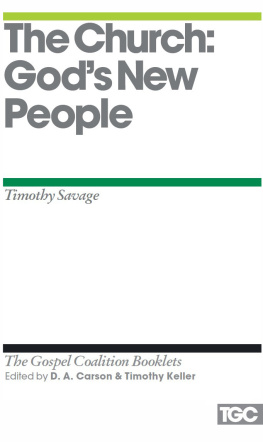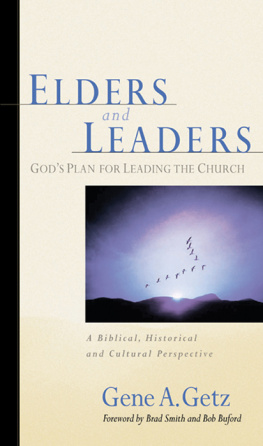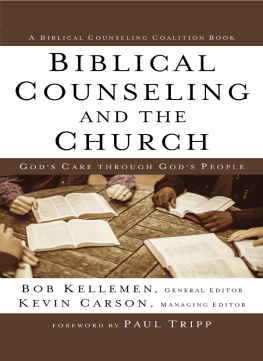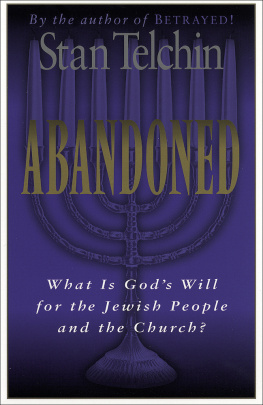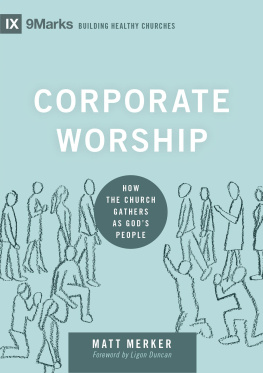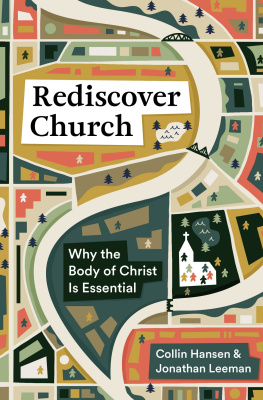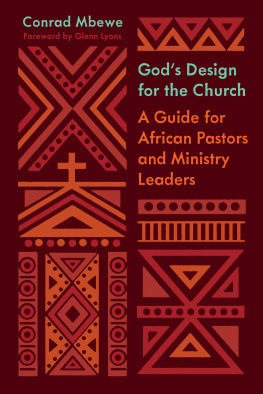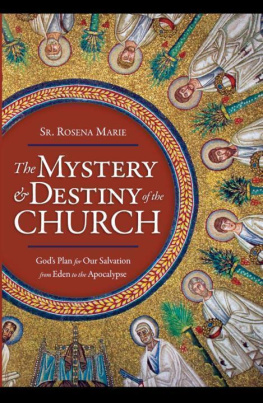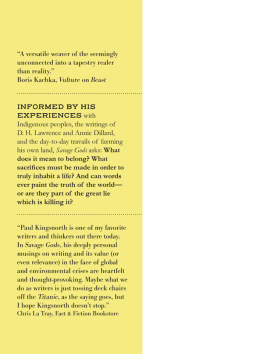Savage Timothy B. - The Church: Gods new people
Here you can read online Savage Timothy B. - The Church: Gods new people full text of the book (entire story) in english for free. Download pdf and epub, get meaning, cover and reviews about this ebook. City: Wheaton;Ill, year: 2011, publisher: Crossway, genre: Religion. Description of the work, (preface) as well as reviews are available. Best literature library LitArk.com created for fans of good reading and offers a wide selection of genres:
Romance novel
Science fiction
Adventure
Detective
Science
History
Home and family
Prose
Art
Politics
Computer
Non-fiction
Religion
Business
Children
Humor
Choose a favorite category and find really read worthwhile books. Enjoy immersion in the world of imagination, feel the emotions of the characters or learn something new for yourself, make an fascinating discovery.
- Book:The Church: Gods new people
- Author:
- Publisher:Crossway
- Genre:
- Year:2011
- City:Wheaton;Ill
- Rating:5 / 5
- Favourites:Add to favourites
- Your mark:
- 100
- 1
- 2
- 3
- 4
- 5
The Church: Gods new people: summary, description and annotation
We offer to read an annotation, description, summary or preface (depends on what the author of the book "The Church: Gods new people" wrote himself). If you haven't found the necessary information about the book — write in the comments, we will try to find it.
Savage demonstrates that the church is the locus of Gods plan of redemption and that it is here that the larger dimensions of his plan for creation receive breathtaking definition. A Gospel Coalition booklet.
The Church: Gods new people — read online for free the complete book (whole text) full work
Below is the text of the book, divided by pages. System saving the place of the last page read, allows you to conveniently read the book "The Church: Gods new people" online for free, without having to search again every time where you left off. Put a bookmark, and you can go to the page where you finished reading at any time.
Font size:
Interval:
Bookmark:

The Gospel Coalition Booklets
Edited by D. A. Carson & Timothy Keller
Gospel-Centered Ministry by D. A. Carson and Timothy Keller
The Restoration of All Things by Sam Storms
The Church: Gods New People by Tim Savage
The Holy Spirit by Kevin L. DeYoung
Can We Know the Truth? by Richard D. Phillips
What Is the Gospel? by Bryan Chapell
The Plan by Colin S. Smith
The Church: Gods New People
Copyright 2011 by The Gospel Coalition
Published by Crossway
1300 Crescent Street
Wheaton, Illinois 60187
All rights reserved. No part of this publication may be reproduced, stored in a retrieval system, or transmitted in any form by any means, electronic, mechanical, photocopy, recording, or otherwise, without the prior permission of the publisher, except as provided for by USA copyright law.
Cover design: Matthew Wahl
First printing 2011
Printed in the United States of America
Unless otherwise indicated, Scripture quotations are the authors translation.
All emphases in Scripture have been added by the author.
Trade paperback ISBN: 978-1-4335-2679-4
PDF ISBN: 978-1-4335-2680-0
Mobipocket ISBN: 978-1-4335-2681-7
ePub ISBN: 978-1-4335-2682-4
| Crossway is a publishing ministry of Good News Publishers. |
VP 20 19 18 17 16 15 14 13 12 11
14 13 12 11 10 9 8 7 6 5 4 3 2 1
I t is the most strategic body of people on the face of the planet. Through its ministries, vast tracts of humanity are rescued from evil and lifted from despair. And by its voice, new life is proclaimed to entire civilizations. It is an association of people that pulsates with the glory of God. What human gathering could possibly warrant such accolades? Only one qualifies: the church of Jesus Christ.
Few Christians are aware of the explosive nature of the church to which they belong. Several years ago when transporting the English churchman John Stott to the place where he was preaching, I asked him what he thought was the most neglected doctrine among contemporary Christians. Supposing he would say, theology (our view of God is too small), or possibly, soteriology (our methods of salvation are too self-reliant), I was surprised to hear him reply without hesitation ecclesiology. To me, the doctrine of the church seemed peripheral to other more weighty doctrines and certainly not worthy of the stature my interlocutor ascribed to it. But in the years since, after reflection on the biblical teaching of the church, I have come to see otherwise. The church of Jesus Christ is the locus of Gods plan for creation.
According to the Bible, God is executing a plan of cosmic dimensions. He is in the process of reclaiming all things for his glory. Writing to believers in Ephesus, the apostle Paul makes a stunning observation: God is summing up all thingsthings in the heavens and things on earthunder one head, namely, Christ (Eph. 1:10). Precisely where this comprehensive summation is taking place Paul makes clear a few verses later: God has given Christ as head over all things to the church (Eph. 1: 22).
Remarkably, the church is ground zero in Gods ambitious reclamation project. It is home base for the execution of Gods work in the world, the place where all things are being drawn together under Christ. If we want to see what God is doing on this planetand who would want to miss something so spectacular?we must look to the church. Here, and only here, we find a people drawn together and filled with all the fullness of God (Eph. 1:23; 3:19).
The link between Christ and the church is nearly seamless. The church is the body of Christ, and Christ is its head (Col. 1:18). The church reverberates with the resurrection power of Christ himself (Eph. 1:1920). It personifies his love (Eph. 5:2). It manifests his fullness (Col. 2:910). It is a new man measuring up to the full stature of Christ himself (Eph. 4:13). And yet the church is also distinguished from Christ. It is his bride (Eph. 5:2527). It is the one he nurtures and cherishes as his own flesh (Eph. 5:29). It is the repository of the Fathers wisdom (Eph. 3:10). It is where God receives all glory (Eph. 3:21). It is a beacon of divine light, a foretaste of heavenly glory (Eph. 1:18).
Perhaps the best way to envisage the churchaccounting for both its organic link to Christ and its distinctiveness from Christis as a family related by blood. Members of the church are blood relatives. They share the same Father, from whom every family in heaven and on earth receives its name (Eph. 3:14). They share the same elder brother, Christ (Heb. 2:17), whose blood shed on the cross has reconciled them to the heavenly Father (Col. 1:20). And they share a fraternity with their spiritual siblings, brothers and sisters in Christ (Col. 1:2), who are reconciled to each other by the same blood of the cross (Eph. 2:13).
It is especially as a family that the church forms the centerpiece of Gods work in creation. This should not be surprising, because God has always worked through families. Right from the beginning he formulated his agenda in terms of a family. It will be enormously helpful as we seek to understand the unique and powerful role of the church to venture back into primordial history and look at the very first family, the family of Adam and Eve, and to notice how their union serves as a picture of what would later become the church of Jesus Christ.
The drama of the sixth day of creation never ceases to amaze us. It was then that God fashioned his magnum opus, a human being, and bequeathed to him a magnificent garden paradise. The new creature apparently lacked for nothing. He was the beneficiary of a priceless bounty from the hand of a loving Creator. Yet, surprisingly, there was a deficiency. Something was not good. The solitary man lacked a helper, someone who corresponded to him (Gen. 2:18). By himself he was but one piece of a two-piece puzzle, and the adjoining piece was nowhere in sight. Not only was he bereft of the comforts of companionship, but far more importantly he was unable to fulfill his purpose in creation.
Man was created to bear the image of God, to manifest the likeness of his Maker (Gen. 1:26). Such a tall order could not be accomplished in isolation. So when God fashioned man, he created him male and female (Gen. 1:27). In other words, he constructed man as a family, subject to the interpersonal relations inherent within every family. The relational component of the divine likeness is hardly surprising given the fact that God himself is a family of triune relationsFather, Son, and Holy Spirit. To manifest the divine image thus requires at least a duality of persons. Man needs help for his lofty calling. He needs a family.
The first family was given an exalted mandate. No sooner had God invested Adam and Eve with his image than he issued the following injunction: Be fruitful and multiply and fill the earth and subdue it (Gen. 1:28). What sounds like a recipe for overpopulation is actually a prescription for ecological blessing. By calling for the multiplication of families, God intends to saturate the planet with relational units manifesting his image, so that every nook and cranny of creation will be subdued by the presence of his likeness. Under the sovereign decree of an all-wise God, the family is the vehicle by which his triune likeness will be disseminated to the four corners of the earth.
Font size:
Interval:
Bookmark:
Similar books «The Church: Gods new people»
Look at similar books to The Church: Gods new people. We have selected literature similar in name and meaning in the hope of providing readers with more options to find new, interesting, not yet read works.
Discussion, reviews of the book The Church: Gods new people and just readers' own opinions. Leave your comments, write what you think about the work, its meaning or the main characters. Specify what exactly you liked and what you didn't like, and why you think so.

